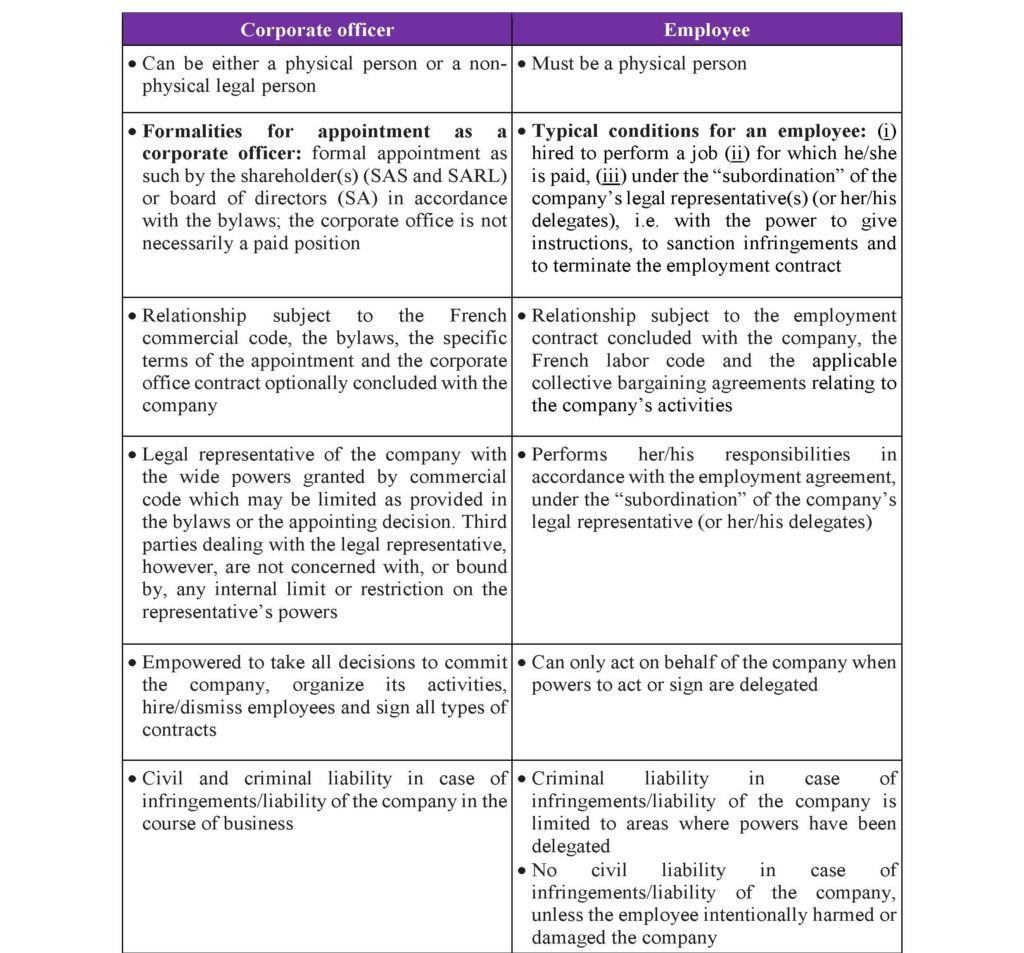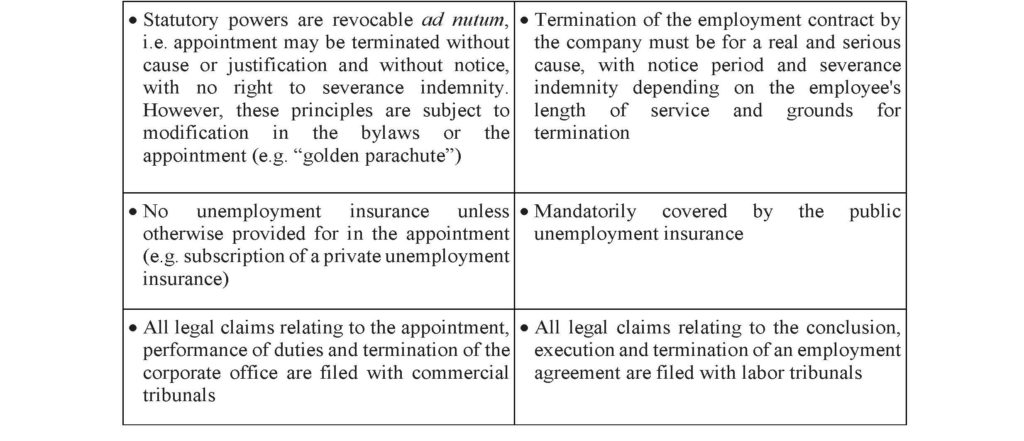8 avril 2021 – Employee or corporate officer? Know the differences and consequences under French labor law
Cet article est disponible exclusivement en anglais.
Should the new CEO/General Manager of a French entity be hired through an employment contract?
This question is often asked by foreign clients or law firms with which we work on in an M&A transaction where the new foreign owner wants to “promote” an existing senior executive to the role of CEO/Président or general manager/Directeur Général and can’t understand why their choice is reluctant to swap her/his status as an “employee” to become a “corporate officer”.
“Employees” and “corporate officers” under French law
Under French law there is a clear distinction between an employee (blue-collar, white-collar, senior executive, etc.), whose legal relationship with the company is determined by an employment agreement and applicable labor laws, and a corporate officer, whose relationship with the company in which she/he holds a corporate office is determined by commercial code.
French corporate law requires that a company must be represented by at least one individual or non-physical legal person, who will manage the company and be its legal representative. Depending on the form of the company, the main legal representative is the CEO/Président or President-General Manager or Manager/Gérant, expressly identified on the Extrait K-bis, the French official identification document for companies, and upon appointment is automatically a corporate officer. No employment agreement is required.
In the case of a société anonyme (SA) the appointment is made by the board of directors. In the case of a société par actions simplifiée (SAS) and a société à responsabilité limitée (SARL) the appointment is made by the shareholders as neither form of company is required to have a board of directors.
In the case of a larger company (typically an SA), if the representative is a non-physical legal person, (such as the holding entity of the group to which the French company belongs) – or an individual, such as a person who does not necessarily have the ability or capacity to manage or run all of the operations of the company, the representative often needs to rely on one or more physical persons to handle operational matters. Usually these persons are General Manager/Directeur Général/Directeur Général Adjoint who are either appointed as “corporate officers” or hired as “employees”.
What are the legal differences between a “corporate officer” and an “employee” under French law?


Is it possible to hire a corporate officer under the terms of an employment agreement?
A key distinction between a corporate officer and an employee is the application of the “subordination” concept as the President in law has all of the powers to act on behalf of the company and is therefore not subject to “subordination”. Accordingly, it is very rare for a corporate officer of a company to also be an employee of the same company.
This being said, sometimes, a corporate officer can simultaneously hold a corporate office and be bound by an employment agreement with the same company. This double status is however limited to situations where the three following conditions are met: the person must (i) perform technical duties as employee that are different from the ones that must be performed as corporate officer (e.g. the corporate officer may perform a particular engineering function in the company) (ii) be compensated by a salary in respect of his/her employee’s duties and (iii) perform the employee’s duties (e.g. in the group’s engineering business) in which he will be “subordinate” within the company (e.g. to the President of the company and/or to the Head of the Engineering Division of the parent company).
If those conditions are all met, the person will be termed “double-hatted”: i.e. deemed to be a genuine employee while performing her/his employee’s duties and at the same time deemed to be a corporate officer while performing the duties of her/his corporate office. These separate relationships with the company must be managed separately, as if the corporate officer and the employee were two persons.
As the two relationships are legally distinct, the same circumstance may have different outcomes, e.g. a management mistake made by the “double-hatted” person in carrying out her/his responsibilities as a corporate officer which results in the legitimate termination of her/his position as a corporate officer does not, in principle, also justify the termination of her/his employment contract.
Conversely, when the “double-hat” situation is not possible because the above-mentioned conditions are not met, the employment agreement will be temporarily suspended until the corporate office terminates. During suspension, her/his duties as employee will be performed by the corporate officer if deemed absorbed by the corporate mandate or by someone else, the salary under the employment agreement will not be paid and the executive will notably not acquire rights regarding public unemployment insurance as of his/her appointment as corporate officer. Once the term of the appointment to the corporate office ends, the employment agreement will automatically revive, regardless of the reason why the corporate office has ended.
Before entering into a “double-hat” arrangement, it is highly recommended to ask the French public unemployment insurance agency (Pôle emploi) to assess if the required conditions are met (notably the subordination link), via the specific “rescrit” procedure. Under this procedure, the employer and the employee/corporate officer complete a detailed questionnaire (available on Pôle emploi’s website) and provide documents to enable Pôle emploi to assess whether the “double-hat” situation is possible or not.
We are frequently asked to assist our clients with this procedure and draft a covering letter explaining the situation more fully than is allowed by the questionnaire available online, to improve the likelihood of success of the application.
What can be done to encourage an employee to accept the position of corporate officer when the “double-hat” situation is not possible?
The reluctance of a senior employee of a company to become the President and/or General Manager of a French company is understandable when considering the personal cost of possibly losing the considerable benefits of employment agreement (e.g. potential loss of rights to unemployment insurance, no accrual of seniority as corporate officer for the calculation of the rights of the employee on termination, no guarantee of being paid in case of bankruptcy of the company, etc.).
To address this situation, the appointment of the President and/or General Manager will often include terms that are designed to reduce as much as possible the disadvantages of holding a corporate office by providing similar “employment-style” benefits to the corporate officer, such as private unemployment insurance, a “golden parachute” in case of termination without cause, the accrual of seniority as corporate officer and/or a compensation package with the same features as that available to senior executive employees of the company, etc.
If the French subsidiary belongs to a group of companies, another and often simpler option can be used if the “double hat” situation is not possible. As a first step, the employment agreement of the employee who is to be appointed as corporate officer is transferred to another group company (e.g. the holding company). The duties and responsibilities of the employee under that employment agreement are to perform the duties and responsibilities of the corporate officer of the French subsidiary (i.e. with all power to act on behalf of the French subsidiary). The second step is the appointment of the employee as corporate officer of the French subsidiary. As the employment agreement and the corporate office are with two different entities, there is no risk of a “double hat” situation and the employee will maintain the protections granted by the employment agreement under French labor law.
Marie-Emilie Rousseau-Brunel, partner,
and Christophe Calvao, associate.
- Marie-Emilie Rousseau-Brunel
- Christophe Calvao
Téléchargez le PDF ici : VA – Employee or corporate officer


